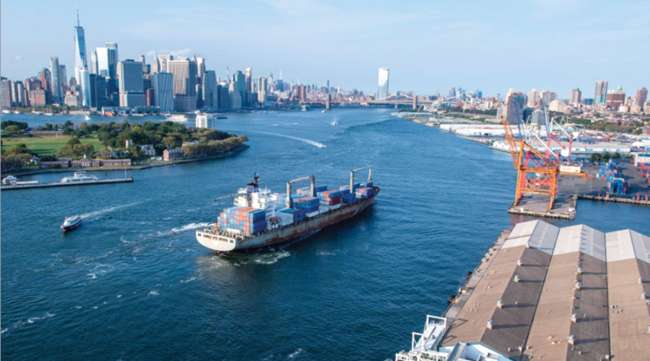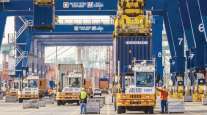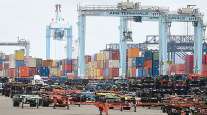Senior Reporter
House Climate Change Plan Tackles Heavy-Duty Equipment at Ports

[Stay on top of transportation news: Get TTNews in your inbox.]
Congress should increase funding for programs at the U.S. Environmental Protection Agency and the Department of Energy to reduce emissions from heavy-duty equipment at ports, according to a recent plan from House Democrats.
In “Solving the Climate Crisis: The Congressional Action Plan for a Clean Energy Economy and a Healthy, Resilient, and Just America,” Democrats outlined goals for improving fuel economy and advancing electrification across the transportation system. Ultimately, policymakers proposed reaching net-zero greenhouse gas emissions within three decades.
“When ships dock at a port and continue to run their diesel engines, they generate significant air pollution, including smog-forming nitrogen oxides and fine particles that can trigger asthma attacks and other respiratory problems,” according to the plan, published June 30. “Communities located near these ports — often environmental justice communities — bear the brunt of this air pollution.”
House Select Committee on the Climate Crisis by Transport Topics on Scribd
The report also proposed that officials design freight and passenger transportation systems with the capability of withstanding the impact of severe weather events, such as floods and hurricanes. Additionally, it proposed that Congress expedite the deployment of zero-emission technologies in sectors in which such technologies are available. And, it called for setting stricter greenhouse gas emission standards for cars, heavy-duty trucks and across aviation, while proposing upgrades across the country’s rail system.
“Ambitious initiatives to ensure more domestic manufacturing of cleaner vehicles and their components must accompany these policies,” according to the plan. “At the same time, Congress should establish a low-carbon fuel standard to reduce emissions from remaining gasoline-powered vehicles and transportation modes for which electrification may not be an option in the short to medium term, such as aviation, longhaul trucking and shipping.”
A $1.5 trillion infrastructure package the House passed mostly along party lines this month proposes climate resilience across the infrastructure networks. Provisions added to the measure include a requirement that medium- and heavy-duty vehicles purchased by the federal government aim for zero emissions. The measure has little chance of advancing in the Senate, where a committee in the upper chamber advanced a five-year highway policy bill that promotes similar climate change provisions.

Castor
“We have a plan — and it comes at a critical time,” said Rep. Kathy Castor (D-Fla.), chairwoman of the House Select Committee on the Climate Crisis. “Our plan will put people back to work and rebuild in a way that benefits all of us. That means environmental justice, and our vulnerable communities are at the center of the solutions we propose. The health of our families and the air we breathe are at the heart of our plan.”
She added, “We chart the course to good-paying jobs in solar and wind energy, in manufacturing American-made electric vehicles and in strengthening communities, so they are more resilient to flooding, extreme heat, intense hurricanes and wildfires.”
Senior Republicans have criticized the Democrats’ positioning on climate change initiatives, such as the committee’s report and the Green New Deal manifesto that proposed major reductions in traditional sources of energy over the next decade across commercial transportation.
RELATED: House Infrastructure Bill Will Never Become Law, Rep. Sam Graves Says
“We will be guided by facts, more science, conservative principles and American interests as we assess the Democratic staff’s work. Over 90% of all emissions will soon originate outside U.S. borders,” said Rep. Garret Graves (R-La.), ranking member on the Select Committee on the Climate Crisis. Graves also is a member of the Transportation and Infrastructure Committee. “If the United States aims to reduce global emissions and lead the global energy future, then poorly designed domestic climate policies that increase costs or add burdensome regulations must be avoided.”
Want more news? Listen to today's daily briefing:
Subscribe: Apple Podcasts | Spotify | Amazon Alexa | Google Assistant | More




